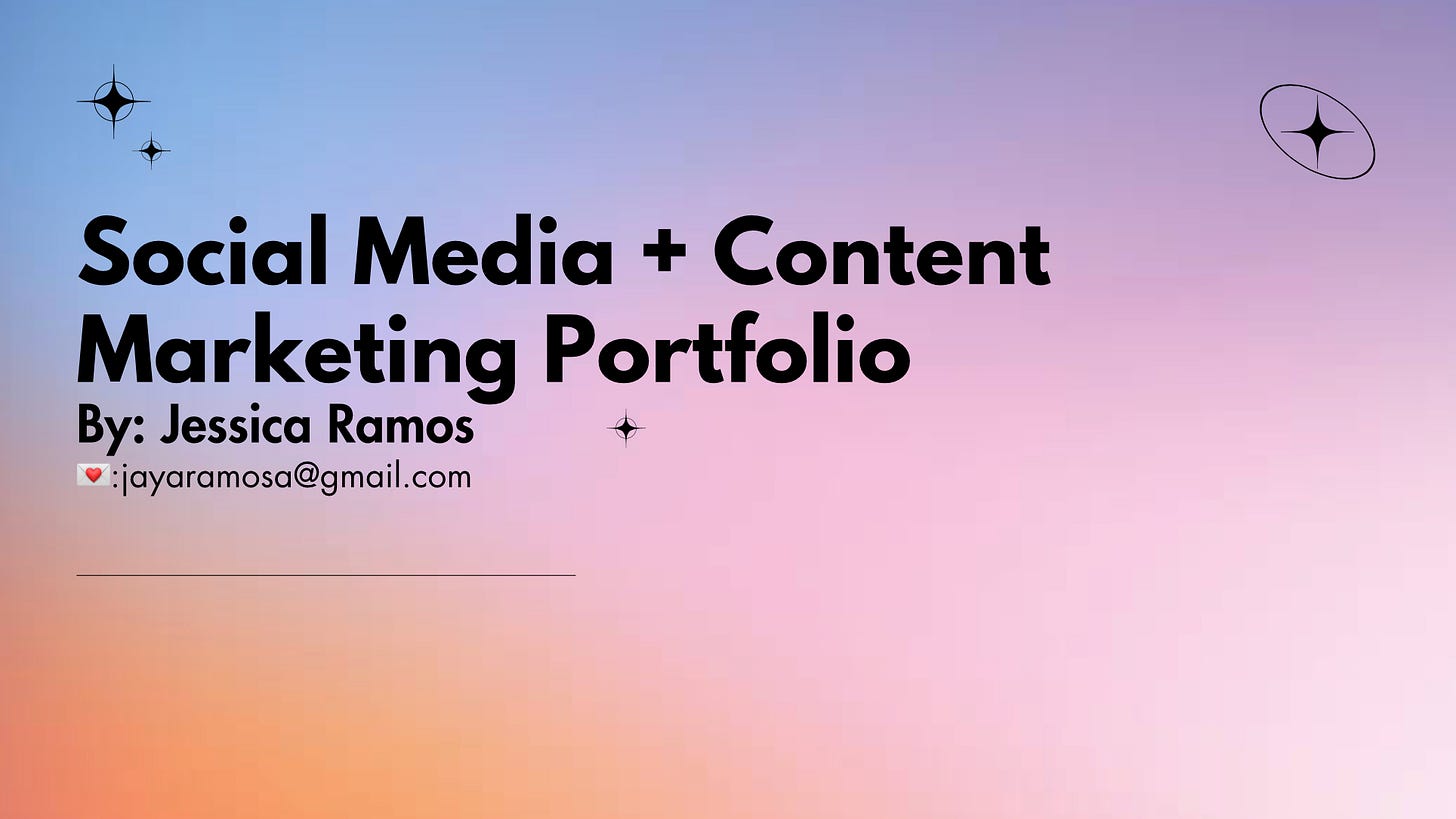How I Got 3 Job Offers in 1 Day a Month After I Quit My Job
My strategy for job hunting from someone who pretends to know what a KPI is
In June 2024, just a month after quitting my full-time job and going freelance, I got 3 job offers within 24 hours. I was on cloud nine, especially since LinkedIn’s constant discourse about the job market was grim. I was fully expecting not to have a job in the first 8 months, honestly.
I don’t say this to brag. I say this because I’d like to offer some advice for job seekers. Americans are likely barreling towards a recession thanks to Trump's whiplash decision-making. It’s exhausting, and so, of course, people are starting to panic and share their “recession” tips. Well, here’s my contribution.
A little backstory of me: I’m a completely self-taught freelance writer and social media marketer who started my career in journalism, but quickly made the switch to pursue more financial stability. I started my career from Madrid, Spain, where I moved to teach English, but quit to pursue writing after a year and a half.
Five years, later, I quit my full-time job and moved from Madrid back home to California because I was tired of living paycheck to paycheck (you don’t make much money in Spain if you aren’t remote). Plus, I really hated my job.
It was a huge risk, but one that was worth making. The light at the end of the tunnel came even quicker than I realized because just a month after quitting and returning home, I was offered 3 jobs within 24 hours.
I felt like I had just duped everyone, but in actuality, this all came after several months of carefully tweaking my resume and job hunt until it was as perfect as it could be. So, here’s more about my job-hunting strategy, split into 2 parts.
Pt. 1 - How I Prepared for Job Hunting
First off, I just want to point out. I was never a great student, which translated into me being clueless about entering the corporate world when I graduated college. Neither of my parents graduated high school or could give me guidance about how to get ahead. So going from a clueless job seeker to someone who could give job advice to my friends was a long process. That’s why I think I’ve got a great background for giving out this advice because if I can figure out how to be competitive, especially with such a shitty economy, then I think you can too.
So, let’s get into it. These are the areas I focused on when I first started my job hunt and the tips I suggest for anyone looking for a new job. Keep in mind, I started implementing these tools in January, and started getting interviews by June, so start early!
I updated my resume every week
The first thing I did was update my resume in a big session that took me days to finish. If you haven’t touched your resume, this is likely what you’ll have to do. Set an hour or two each day to work on it until it’s finally up-to-date with your recent accomplishments. After the big update was done, I started updating it weekly whenever I accomplished something big at work or took on a new task so that it was always up-to-date. This helps me speed up my process when I apply for a job currently,
I looked at other people’s resumes
I don’t know if this is exactly ethical, but to be honest, I don’t understand why anyone would have a problem with it. I would go on LinkedIn and whenever someone’s resume was public or they had their job tasks listed in their job experience section of their LinkedIn, I would take a peak. This was incredibly helpful for me because it helped me to see how people with more experience or mentorship were writing out their tasks. It helped me to learn the corporate language of marketing and showed the formula for listing my accomplishments (It usually has a common formula with a quantifiable number or percentage.)
I asked my friends in HR
If my friends had impressive careers, worked in the same industry as me, or worked in HR or recruiting, I asked them to look at my resume. I also asked them to look it over for typos. This was crucial in the beginning because I was the first to admit that I didn’t know what I was doing. Sometimes your friends may be busy, and that’s okay, but it never hurts to ask them for help.
I used AI
I also asked Chat GPT to run over my resume and give me tips based on job listings I was seeing online. I would specifically ask it to compare my resume and what I’ve done to what the job posting was asking for. Or I would ask Chat GPT to take my idea of what I did at my job and turn it into a professional bullet point for my resume. You have to do a lot of tweaking to make sure it doesn’t spit out a weird format or LIE (which I’ve seen it do), but this is really helpful for me when I’m struggling to professionally describe my work or tasks.
I announced I was looking for work
I was never shy about this. I made announcements on LinkedIn and Instagram stories and always let people know I was looking, especially since I had just moved back to California and needed to build my network. I actually ended up landing 1 of my jobs this way through my cousin, though it didn’t end up being a fit.
I made a portfolio
After a while, I realized that I needed a portfolio, so I made one using a template from Canva and some gradient backgrounds. It included all of my data, strategy, and case studies. I’m not sure if it’s helped, but I think the more representations of your career that you have, the better.
Pt. 2 - Where I Found Jobs:
So that was just the beginning of my job search. The next part was applying, which I tried to do for a couple of hours a day but no more than that so that I didn’t burn myself out.
Probably the most-asked question is “Where do you find jobs?” I looked and applied for jobs EVERYWHERE and applying is a numbers game so the more pointed applications you send out the better. Keyword, pointed. I was only applying for jobs I wanted or that I could actually do. At first, I kept a spreadsheet, but I never found that following up with a job ever made a difference.
LinkedIn Feed
The LinkedIn feed has been the number one resource for me when it comes to finding jobs. I’ll be honest and say that I don’t get a ton of interviews compared to how many I apply to (but that’s normal), but I get a lot more responses and even some personalized rejections than when I just send off a resume. And the interviews I do have, I get the job 60% of the time.
My strategy is to follow a lot of recruiters, software companies, or communities like Teal and the Min Cave, and colleagues in my industry. Also, anyone who shares a lot of jobs, job boards, or reposts jobs. These people will fill your feed with a constant influx of messages about people hiring. Now, of course, sometimes these are flooded with messages, but if you can get in early and start out with a great intro message. Here is what I usually go with.
Hi, my name is [BLANK] I’m a [TITLE] with [YEARS OF EXPERIENCE] I thought this role was a perfect fit because [COME UP WITH A GENUINE REASON] Some of my recent and relevant accomplishments include [ANY STATS OR ACCOMPLISHMENTS YOU’VE RECENTLY MADE IN YOUR JOB THAT ARE RELEVANT TO THE JOB DESCRIPTION] I’ve attached my resume + portfolio and hope to chat soon if you think I’m a fit.
Keep it concise and impressive. And if you really think you are the perfect fit for a role, don’t be afraid to send a DM to the hiring manager as well.
Newsletters
When I was doing more journalism work, I would often find calls-for-pitches in a few newsletters I followed. Granted, I’ll say that I’m against newsletter job boards now because it’s nuts that people want to gatekeep jobs for pay just so they can “provide value” and have a business. I think it’s shitty how big this has gotten, but this used to be a way I got jobs, so I’m including it here. If you see any that are free or any that provide tailored and valuable jobs, give them a follow.
Social media
I used to see people hiring in Instagram stories and in fact, I bonded with someone recently because they were looking to hire for a client of theirs, and we had a lot in common. I’ve seen people hiring on Twitter (refusing to call it X), Instagram, and even Threads, so keep your eyes peeled and follow your favorite brands and companies, because more and more people are sourcing talent through socials these days.
Reaching out directly to companies
If you don’t see an opportunity, it doesn’t mean there isn’t one available. Try reaching out to brands and businesses that you’d like to work for, send them your updated resume, portfolio, and/or website, and convince them why you could be a solution to their company’s problems. Don’t be too pushy though. Send the initial email, maybe 1 follow-up a week later (don’t count holidays or the weekend) and then move on.
And those are my tips. I feel like these might be kind of obvious tips, but I’m trying to remember that we all have to start somewhere, and I learned all of this through strategizing and trial and error. But at least now you have some tips that can help jumpstart your search.









